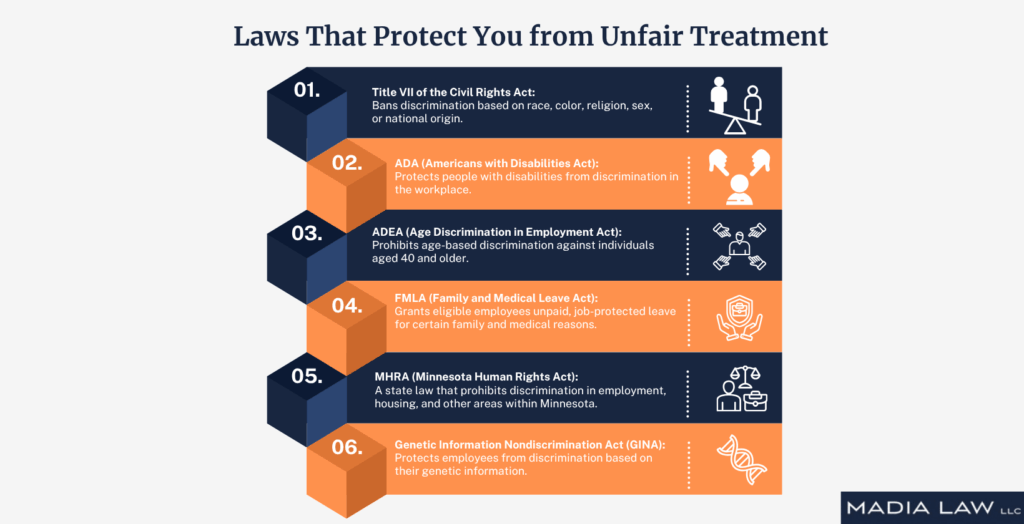
Facing unfair treatment at work can be distracting to your productivity and stressful on your emotions, but you are not without protection and an effective method of defense. Federal and state laws exist to safeguard employees from discrimination, harassment, and retaliation based on race, gender, age, disability, and other protected characteristics. These legal protections ensure you that you are treated fairly, regardless of who you are or where you work.
Whether in hiring, promotions, pay, job assignments, or termination, these longstanding laws aim to create a level playing field for all workers. At the heart of this protection are 6 key laws that form the foundation of your workplace rights. Each one addresses a specific type of injustice, helping ensure every employee has the opportunity to thrive without bias or unequal treatment.
At Madia Law, we help Minnesota employees understand these rights, recognize when they are being or have been violated, and take legal action when necessary.
6 Key Federal & State Laws That Protect Your Workplace Rights
Federal laws adhering to the United States Constitution set a clear standard: your identity is never a legal justification for unfair treatment on the job. These laws prohibit discrimination in all areas of employment, including hiring, compensation, promotion, and termination. Each law focuses on different protected characteristics and ensures that personal identity is never a lawful reason for unfair treatment.
1. Title VII of the Civil Rights Act: The Foundation of Equality
Title VII of the Civil Rights Act of 1964 is a cornerstone of employee protection, making it illegal for employers to discriminate based on race, color, religion, sex (including pregnancy, sexual orientation, and gender identity), or national origin. It applies to every stage of employment from job postings and interviews to promotions, pay, and termination.
What makes Title VII especially powerful is its reach. It addresses not only obvious acts of discrimination but also subtle biases, like unfair scheduling, unequal access to training, or skewed performance evaluations. If you feel that you are being judged by who you are rather than how you perform and can provide adequate supporting evidence, Title VII gives you the legal right to take action and seek fair treatment.
2. Americans with Disabilities Act (ADA): Your Right to Fair Access
The Americans with Disabilities Act (ADA) protects workers with physical or mental impairments from discrimination in the workplace. It ensures that qualified individuals have the right to fair treatment and access to opportunities by requiring employers to provide reasonable accommodations that enable them to perform essential job duties.
These accommodations can include flexible schedules, modified tasks, assistive technology, or medical leave, depending on the nature of the disability. The ADA covers a broad range of conditions, from mobility challenges and chronic illnesses to mental health disorders like anxiety or depression.
If an employer denies accommodations or treats you unfairly because of a disability, the ADA gives you the legal power to stand up for your rights. Equal access to work is not just a favor granted… it’s the law.
3. Age Discrimination in Employment Act (ADEA): Protecting Workers Over 40
The Age Discrimination in Employment Act (ADEA) protects employees aged 40 and older from discrimination in the workplace. It prohibits employers from making decisions about hiring, firing, promotions, compensation, or job assignments based solely on age.
The ADEA is designed to prevent employers from favoring younger workers or pushing older employees toward early retirement. If you believe age has played a role in how you are treated at work, the ADEA gives you the right to take legal action. Your experience is your strength, and the law ensures that it is respected.
4. Family and Medical Leave Act (FMLA): Protecting Your Time for Health & Family
The Family and Medical Leave Act (FMLA) gives eligible employees the right to take up to 12 weeks of unpaid, job-protected leave for personal or family health needs, without fear of losing their job. This federal law supports those facing serious medical conditions, welcoming a new child, or caring for an immediate family member.
The Family and Medical Leave Act (FMLA) gives eligible employees the right to take up to 12 weeks of unpaid, job-protected leave for personal or family health needs, without fear of losing their job. This federal law supports those facing serious medical conditions, welcoming a new child, or caring for an immediate family member.
FMLA leave covers:
- Recovery from a personal illness, injury, or surgery
- Caring for a spouse, parent, or child with a serious health condition
- Bonding with a newborn or newly adopted child
Your employer cannot legally penalize you for taking qualified leave. The FMLA exists to make sure that when significant moments in your family life demand your undivided attention, your job will still be there when you return.
5. Strong State-Level Protections: Minnesota Human Rights Act (MHRA)
The Minnesota Human Rights Act (MHRA) offers some of the most comprehensive workplace protections in the country. It prohibits discrimination based on a wide range of characteristics, including race, religion, sex, age, disability, sexual orientation, marital status, and even public assistance status.
Unlike many federal laws, the MHRA applies to all Minnesota employers, even those with just one employee, making it especially accessible for workers in smaller organizations.
The law also shields you from retaliation if you report discrimination, file a complaint, or take part in an investigation. For Minnesota workers, the MHRA is more than a policy, it’s a powerful tool for ensuring fairness, respect, and accountability in the workplace.
6. Genetic Information Nondiscrimination Act (GINA): Protecting Your Privacy and Future Health
The Genetic Information Nondiscrimination Act (GINA) protects employees from discrimination based on their genetic information, such as family medical history or the results of genetic tests. Employers cannot use this information to make decisions about hiring, firing, promotions, or job assignments.
GINA also prevents health insurers from using genetic information to determine eligibility, coverage, or premium rates. This law ensures that your private health data stays protected, and that you are judged by your qualifications and past professional achievements, not your DNA.
For a legal consultation, call 612-349-2729
The EEOC: Enforcing Your Right to Fair Treatment
Several of the most important workplace protection laws are enforced by a single federal agency: the Equal Employment Opportunity Commission (EEOC). This agency plays a central role in upholding your rights under federal law.
The EEOC enforces:
- Title VII of the Civil Rights Act
- The Americans with Disabilities Act (ADA)
- The Age Discrimination in Employment Act (ADEA)
- The Genetic Information Nondiscrimination Act (GINA)
If you’ve experienced unfair treatment due to a protected characteristic, such as race, gender, age, disability, or family medical history, your first step is often to file a charge with the EEOC.
The EEOC may investigate your complaint, offer mediation, or determine that you are entitled to a “Right to Sue” letter. This letter is required before you can pursue most federal workplace discrimination cases in court.
What Workplace Actions Are Protected Under These Laws?
Federal and state employment laws protect employees from discrimination, retaliation, and unfair treatment in key areas of employment. The following workplace actions are legally protected:
- Hiring and Job Offers: Employers cannot refuse to hire based on race, gender, disability, age, religion, or other protected characteristics.
- Pay, Benefits, and Bonuses: Employees must receive fair and equal compensation. Unequal pay based on protected traits is unlawful.
- Promotions and Demotions: Decisions must be based on performance and qualifications, not bias or retaliation.
- Disciplinary Actions: Discipline must be applied fairly. Protected activity (like reporting harassment) cannot be punished.
- Terminations or Layoffs: Employees cannot be fired or laid off because of a protected trait or for asserting legal rights.
- Harassment and Hostile Work Environments: Laws prohibit unwelcome conduct that creates an abusive or discriminatory work setting.
- Requests for Accommodation or Leave: Employees are entitled to reasonable accommodations for disabilities or family/medical leave under laws like the ADA and FMLA.
Click to contact our personal injury lawyers today
Retaliation is Also Illegal
Speaking up at work takes courage, and the law is on your side when you do. If you’ve reported harassment, discrimination, or unsafe conditions and your employer responds with threats, discipline, or exclusion, that’s retaliation.
You have the right to report wrongdoing without fear of punishment, and legal protections are in place to hold employers accountable when they cross the line.
What is Retaliation?
Speaking up at work takes incredible courage and resolve, and the law is on your side when you do. If you report discrimination, harassment, unsafe conditions, or request accommodations, your employer cannot legally punish you for it. Retaliation includes actions like termination, demotion, threats, reduced hours, or exclusion from work opportunities.
Federal and state laws protect employees who engage in protected activity, such as:
- Filing a discrimination or harassment complaint.
- Participating in a workplace investigation.
- Requesting a reasonable accommodation.
- Reporting unsafe working conditions or wage violations.
How to Document and Respond to Retaliation?
To protect your legal rights and build a strong retaliation claim:
- Record Every Retaliatory Incident: Log each event with dates, specific actions taken against you, and the names of anyone involved or who witnessed it.
- Preserve Written Evidence: Save emails, text messages, HR complaints, performance reviews, and any internal communication showing a shift in treatment or behavior.
- Report Retaliation in Writing: Submit a formal complaint to HR or a supervisor and request written confirmation or a response timeline.
- Consult an Employment Lawyer Immediately: An Attorney can evaluate your documentation, confirm if retaliation occurred under the law, and help you act within filing deadlines.
Complete a Case Evaluation form now
What to Do If You Believe You’re Facing Unfair Treatment
Knowing these laws is empowering, but what are your next steps if you suspect your rights are being violated?
- Document Every Incident: Write down each event in detail, including dates, times, locations, what happened, who was involved, and any witnesses. Save copies of relevant emails, messages, or records.
- Review Your Company’s Policies: Look at your employee handbook or HR manual. Identify your employer’s official procedures for reporting discrimination or harassment.
- Report Internally (If Required): If safe and appropriate, follow internal reporting procedures. This usually means notifying your manager, HR, or a designated contact.
- File a Complaint with the EEOC or State Agency: The Equal Employment Opportunity Commission (EEOC) handles federal claims. For Minnesota, the Minnesota Department of Human Rights enforces the MHRA. File promptly – time limits apply.
- Consult an Employment Attorney: An experienced Minneapolis employment lawyer can evaluate your case, explain your rights, and recommend the best legal course of action in the Minnesota county court of jurisdiction.
You Don’t Have to Accept Unfair Treatment at Work
Federal and Minnesota laws protect employees from discrimination, retaliation, harassment, and other forms of unfair treatment. These protections guarantee your right to a workplace where you are treated fairly and equally, regardless of your identity or circumstances.
If you’ve experienced mistreatment such as being denied a promotion, pushed out of meetings, or retaliated against for speaking up, you have legal rights. Title VII, the ADA, the ADEA, and the MHRA are just a few laws that protect your dignity and job security.
Headquartered in Minneapolis, Madia Law LLC has years of experience helping Minnesota workers enforce their rights and take legal action when employers cross the line. We will evaluate your situation, explain your options, and guide you toward a swift and satisfactory legal resolution.
Helpful Contacts & Resources
| Resource | Website | Phone |
|---|---|---|
| EEOC | www.eeoc.gov | 1-800-669-4000 |
| Minnesota Department of Human Rights | mn.gov/mdhr | 651-539-1100 |
| U.S. Department of Labor (FMLA) | dol.gov/agencies/whd/fmla | 1-866-487-9243 |
Call 612-349-2729 or complete a Case Evaluation form


